Uncategorized
Bitcoin Euphoria Cools as Whales Wake Up: Crypto Daybook Americas

By Omkar Godbole (All times ET unless indicated otherwise)
Bitcoin’s (BTC) bull run stalled, with prices falling 5% from the record high in a classic bull-market pullback. The adverse price action took the wind out of the broader market, too, though exceptions like BONK and PUMP — up 5% on a 24-hour basis — bucked the trend.
The pullback was characterized by long-dormant BTC whales moving coins to centralized exchanges, often a precursor to a sale. According to blockchain sleuth Lookonchain, an OG wallet with 80K BTC moved about half to Galaxy Digital, which then deposited 6,000 BTC into Binance and Bybit. The on-chain flow occurred after BTC notched Monday’s record high above $123,000.
«A spike in Coin Days Destroyed metric and a rise in large exchange inflows suggest potential profit-taking. Yet despite the historic sell pressure, bitcoin has remained resilient, reinforcing confidence in sustained institutional support and strong structural market demand,» Tagus Capital said in a market update.
Inflows into the U.S.-listed spot bitcoin exchange-traded funds (ETFs) slowed to $297 million on Monday, down 70% from Friday. Meanwhile, inflows into spot ETH ETFs rose to $259 million from $204 million.
Valentin Fournier, the lead research analyst at BRN, called the slowdown in bitcoin inflows a sign of weaker buyer conviction at elevated levels. Today’s consumer price index and Wednesday’s producer price index could set the tone for the next price move, he said.
«Elevated inflation expectations due to tariffs could rattle investor confidence. However, a positive surprise in the data could help calm the current sell-off,» he noted.
Other analysts focused on the House of Representatives votes on the GENIUS and CLARITY Acts, which, if passed, could accelerate broader institutional participation in the crypto market beyond bitcoin.
In other news, Coinbase’s shares hit a record high of $398.50 Monday, with its market cap surpassing $100 billion. According to Arkham Intelligence, SharpLink Gaming bought an additional 24,371 ETH.
In traditional markets, the Japanese 30-year government bond yield briefly rose to 3.20%, matching the multi-decade high set in May. The MOVE index, which measures the 30-day implied volatility in the U.S. Treasury market, turned up from a long-held support, warning of renewed turbulence in bonds. Stay alert.
What to Watch
- Crypto
- July 15: Alchemist staking update launches, allowing token holders to stake ALCH for access to advanced features, premium benefits and ecosystem rewards, potentially boosting token utility and demand.
- July 15: Lynq is expected to debut its real-time, interest-bearing digital-asset settlement network for institutions. Built on Avalanche’s layer-1 blockchain and powered by Arca’s tokenized U.S. Treasury fund shares, Lynq enables instant settlement, continuous yield accrual and improved capital efficiency.
- July 15: TAC, a layer-1 blockchain using proof of stake (POS) consensus and bridging Ethereum DeFi applications into Telegram’s ecosystem, is scheduled to launch its mainnet. Leading DeFi protocols such Curve and Morpho will operate on TAC, bringing decentralized finance to Telegram’s 1 billion+ users.
- July 15, 6 a.m.: Layer-1 blockchain Alephium (ALPH) activates the «Danube» hard fork upgrade on its mainnet, promising 8-second block times, 20,000+ TPS, groupless addresses, passkey login, chained transaction and enhanced developer tools.
- July 15, 1 p.m.: Caffeine, an AI-powered platform that lets anyone build Web3 decentralized apps (dapps) using natural language, launches publicly at the “Hello, Self-Writing Internet” event in San Francisco. Caffeine uses Internet Computer (ICP) technology to generate fully on-chain, production-ready apps. Livestream link.
- July 15, 3 p.m.: U.S. Senate Committee on Agriculture, Nutrition, and Forestry holds a market structure hearing titled “Stakeholder Perspectives on Federal Oversight of Digital Commodities.” Livestream link.
- July 16, 9 a.m.: U.S. House Ways and Means Committee oversight hearing titled «Making America the Crypto Capital of the World: Ensuring Digital Asset Policy Built for the 21st Century.»
- July 18: Lorenzo Protocol, a Cosmos-based blockchain with native token BANK, launches USD1+ OTF on BNB Chain’s mainnet. The institutional-grade on-chain traded fund lets users stake stablecoins to mint sUSD1+ tokens that earn stable, NAV-backed yield from real-world assets, CeFi quantitative strategies and DeFi protocols. All returns are settled in USD1 stablecoin, issued by World Liberty Financial, whose stablecoin infrastructure powers the product’s stable yield mechanism.
- July 18: Shares of the ProShares Ultra XRP Futures ETF (ticker UXRP), providing 2x leveraged exposure to XRP futures contracts, are expected to begin trading on NYSE Arca.
- Macro
- July 15, 8:30 a.m.: Statistics Canada releases June consumer price inflation data.
- Core Inflation Rate MoM Prev. 0.6%
- Core Inflation Rate YoY Prev. 2.5%
- Inflation Rate MoM Est. 0.1% vs. Prev. 0.6%
- Inflation Rate YoY Est. 1.9% vs. Prev. 1.7%
- July 15, 8:30 a.m.: The U.S. Bureau of Labor Statistics (BLS) releases June consumer price inflation data.
- Core Inflation Rate MoM Est. 0.3% vs. Prev. 0.1%
- Core Inflation Rate YoY Est. 3% vs. Prev. 2.8%
- Inflation Rate MoM Est. 0.3% vs. Prev. 0.1%
- Inflation Rate YoY Est. 2.7% vs. Prev. 2.4%
- July 15, 4 p.m.: Keynote speeches by Andrew Bailey, the governor of the Bank of England, and Rachel Reeves, U.K. Chancellor of the Exchequer, at the annual financial and professional services dinner at Mansion House, London.
- July 16, 2 a.m.: U.K.’s Office for National Statistics releases June consumer price inflation data.
- Core Inflation Rate MoM Est. 0.2% vs. Prev. 0.2%
- Core Inflation Rate YoY Est. 3.5% vs. Prev. 3.5%
- Inflation Rate MoM Est. 0.2% vs. Prev. 0.2%
- Inflation Rate YoY Est. 3.4% vs. Prev. 3.4%
- July 16, 8:30 a.m.: The U.S. Bureau of Labor Statistics releases June producer price inflation data.
- Core PPI MoM Est. 0.2% vs. Prev. 0.1%
- Core PPI YoY Est. 2.7% vs. Prev. 3%
- PPI MoM Est. 0.2% vs. Prev. 0.1%
- PPI YoY Est. 2.5% vs. Prev. 2.6%
- July 16, 10 a.m.: Speech by Fed Governor Michael S. Barr on «Financial Regulation» at «Conversation with Governor Barr» in Washington. Livestream link.
- July 17, 10 a.m.: Speech by Fed Governor Adriana D. Kugler on «A View of the Housing Market and U.S. Economic Outlook» at the Housing Partnership Network Symposium in Washington. Livestream link.
- July 17, 6:30 p.m.: Speech by Fed Governor Christopher J. Waller on the economic outlook at an event hosted by the Money Marketeers of New York University.
- Aug. 1, 12:01 a.m.: New U.S. tariffs take effect on imports from trade partners that failed to reach agreements by the July 9 deadline. These increased duties could range from 10% to as high as 70%, impacting a wide range of goods.
- July 15, 8:30 a.m.: Statistics Canada releases June consumer price inflation data.
- Earnings (Estimates based on FactSet data)
Token Events
- Governance votes & calls
- Aavegotchi DAO is voting on a $245,000 funding proposal to expand Gotchi Battler into a revenue-generating game with PvE modes, NFTs and battle passes, aiming to reverse declining player numbers, boost GHST utility and create sustainable rewards. Voting ends July 22.
- Uniswap DAO is conducting a temperature check on Etherlink’s request to co-incentivize Uniswap v3 liquidity. Tezos Foundation would put up $300K for three months of rewards on WETH/USDC, WBTC/USDC and LBTC/USDC, and is asking the DAO for $150K more, aiming to anchor Etherlink’s rising TVL and future native tokens on Uniswap. Voting ends July 18.
- Rocket Pool DAO is voting to finalize Saturn 1’s implementation. Approval by a 75% supermajority will ratify key protocol changes, including new transaction designs and a potential revenue share to the pDAO treasury. Voting ends July 24.
- July 16, 5 p.m.: VeChain to host a monthly update with community representatives and the VeChain Foundation.
- Unlocks
- July 15: Sei (SEI) to unlock 1% of its circulating supply worth $19.07 million.
- July 16: Arbitrum (ARB) to unlock 1.87% of its circulating supply worth $37.15 million.
- July 17: ZKSync (ZK) to unlock 2.41% of its circulating supply worth $9.24 million.
- July 17: ApeCoin (APE) to unlock 1.95% of its circulating supply worth $9.86 million.
- July 18: Official TRUMP (TRUMP) to unlock 45.35% of its circulating supply worth $827.17 million.
- July 18: Fasttoken (FTN) to unlock 4.64% of its circulating supply worth $90 million.
- Token Launches
- July 15: TAC (TAC) to be listed on Binance, Kraken, Bitget, Bybit and others.
- July 16: Bybit to delist Tap (TAP), VaporFund (VPR), Cosplay Token (COT), Souni (SON), Tenet Protocol (TENE), Havah (HVH), and Brawl AI Layer (BRAWL) among others.
Conferences
The CoinDesk Policy & Regulation conference (formerly known as State of Crypto) is a one-day boutique event held in Washington on Sept. 10 that allows general counsels, compliance officers and regulatory executives to meet with public officials responsible for crypto legislation and regulatory oversight. Space is limited. Use code CDB10 for 10% off your registration through July 17.
- July 16: Invest Web3 Forum (Dubai)
- July 20: Crypto Coin Day 7/20 (Atlanta)
- July 21-22: Malaysia Blockchain Week 2025 (Kuala Lumpur)
- July 24: Decasonic’s Web3 Investor Day 2025 (Chicago)
- July 25: Blockchain Summit Global (Montevideo, Uruguay)
- July 28-29: TWS Conference 2025 (Singapore)
- Aug. 6-7: Blockchain.Rio 2025 (Rio de Janeiro, Brazil)
- Aug. 6-10: Rare EVO (Las Vegas)
- Aug. 7-8: bitcoin++ (Riga, Latvia)
- Aug. 9-10: Baltic Honeybadger 2025 (Riga, Latvia)
- Aug. 9-10: Conviction 2025 (Ho Chi Minh City, Vietnam)
Token Talk
By Oliver Knight
- Token issuance platform Pump.fun’s native token was distributed to early users and ICO participants on Monday, debuting at a $2 billion market cap on the back of $1.46 billion in trading volume.
- PUMP began trading at $0.00756 and soon began to feel the pressure, sliding to as low as $0.051 before settling at $0.0056.
- The ICO price was $0.004, meaning that investors has an opportunity to quickly flip the tokens for a profit, creating a wave of selling pressure.
- The token debut coincided with a decline across the wider crypto market, with bitcoin (BTC) losing 4% as it slipped to $117,000 from $123,000, while ether (ETH) and sol (SOL) fell 2% and 4.7%, respectively.
- Crypto exchange Binance also made an attempt to take the limelight, announcing the release of its own token launcher that will rival Pump.fun.
Derivatives Positioning
- Open interest in XRP futures hit all-time highs alongside record activity in BTC futures, both pointing to elevated price volatility ahead.
- Funding rates for major coins are holding above an annualized 10%, suggesting bullish market sentiment. The reading, however, is far from signaling overheated conditions typically seen at market tops or record high prices.
- The cumulative volume delta for the top 25 coins for the past 24 hours is negative, a sign of sellers becoming more aggressive. The pullback might deepen in the short-term.
- Risk reversals tied to short-term BTC and ETH options now show a bias for protective puts, which is common during price declines. The long-end remains bullish.
- Block flows on OTC liquidity network Paradigm featured December risk reversals and ETH out-of-the-money call spreads.
Market Movements
- BTC is down 2.86% from 4 p.m. ET Monday at $116,734.47 (24hrs: -4.13%)
- ETH is down 1.12% at $2,970.70 (24hrs: -2.89%)
- CoinDesk 20 is down 1.79% at 3,566.75 (24hrs: -3.85%)
- Ether CESR Composite Staking Rate is up 15 bps at 3.04%
- BTC funding rate is at 0.0315% (34.40% annualized) on KuCoin

- DXY is down 0.12% at 97.97
- Gold futures are up 0.41% at $3,372.90
- Silver futures are down 0.11% at $38.70
- Nikkei 225 closed up 0.55% at 39,678.02
- Hang Seng closed up 1.45% at 24,553.52
- FTSE is up 0.06% at 9,003.57
- Euro Stoxx 50 is up 0.40% at 5,392.29
- DJIA closed on Monday up 0.20% at 44,459.65
- S&P 500 closed up 0.14% at 6,268.56
- Nasdaq Composite closed up 0.27% at 20,640.33
- S&P/TSX Composite closed up 0.65% at 27,198.85
- S&P 40 Latin America closed down 0.92% at 2,597.40
- U.S. 10-Year Treasury rate is down 1.2 bps at 4.415%
- E-mini S&P 500 futures are up 0.29% at 6,329.00
- E-mini Nasdaq-100 futures are up 0.54% at 23,158.75
- E-mini Dow Jones Industrial Average Index are unchanged at 44,694.00
Bitcoin Stats
- BTC Dominance: 64.25% (-0.41%)
- Ether to bitcoin ratio: 0.02549 (1.39%)
- Hashrate (seven-day moving average): 906 EH/s
- Hashprice (spot): $58.8
- Total Fees: 5.74 BTC / $693,498
- CME Futures Open Interest: 153,280 BTC
- BTC priced in gold: 34.8 oz
- BTC vs gold market cap: 9.86%
Technical Analysis
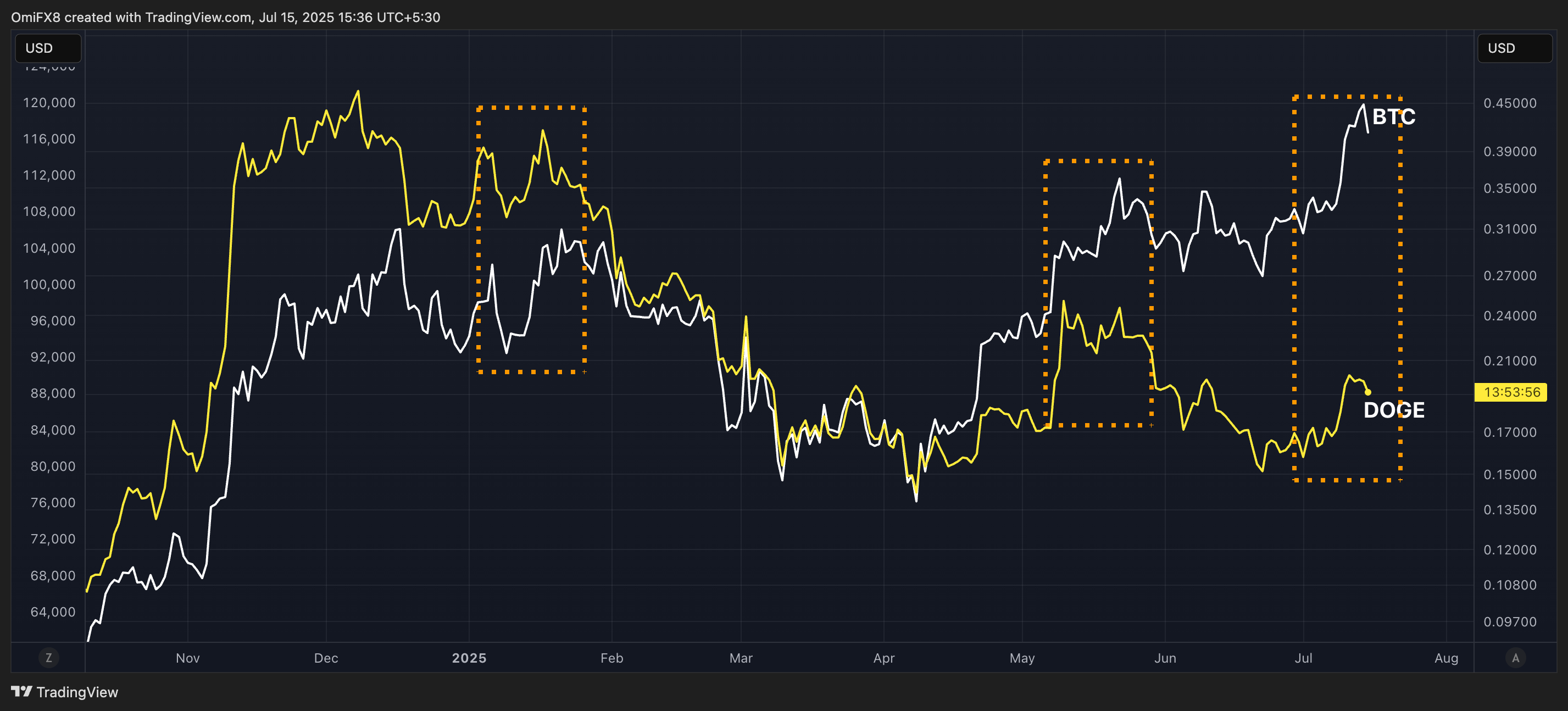
- Since 2024, every new high in BTC has seen dogecoin (DOGE), the world’s largest meme token, hit a lower high than the preceding one.
- The divergence hints at declining investor interest in non-serious tokens.
Crypto Equities
- Strategy (MSTR): closed on Monday at $451.02 (+3.78%), -2.04% at $441.80
- Coinbase Global (COIN): closed at $394.01 (+1.8%), -1.41% at $388.47
- Circle (CRCL): closed at $204.7 (+9.27%), -1.93% at $200.75
- Galaxy Digital (GLXY): closed at $21.45 (+3.97%), unchanged in pre-market
- MARA Holdings (MARA): closed at $19.21 (+0.37%), -1.56% at $18.91
- Riot Platforms (RIOT): closed at $12.51 (+0.72%), -2.4% at $12.21
- Core Scientific (CORZ): closed at $13.56 (+8.39%), +2.58% at $13.91
- CleanSpark (CLSK): closed at $12.6 (-0.4%), -1.9% at $12.36
- CoinShares Valkyrie Bitcoin Miners ETF (WGMI): closed at $25.57 (+3.19%)
- Semler Scientific (SMLR): closed at $45.23 (-0.66%), -0.51% at $45
- Exodus Movement (EXOD): closed at $33.70 (+2.12%), +2.34% at $34.49
ETF Flows
Spot BTC ETFs
- Daily net flows: $297.4 million
- Cumulative net flows: $52.64 billion
- Total BTC holdings ~1.28 million
Spot ETH ETFs
- Daily net flows: $259 million
- Cumulative net flows: $5.58 billion
- Total ETH holdings ~4.47 million
Source: Farside Investors
Overnight Flows
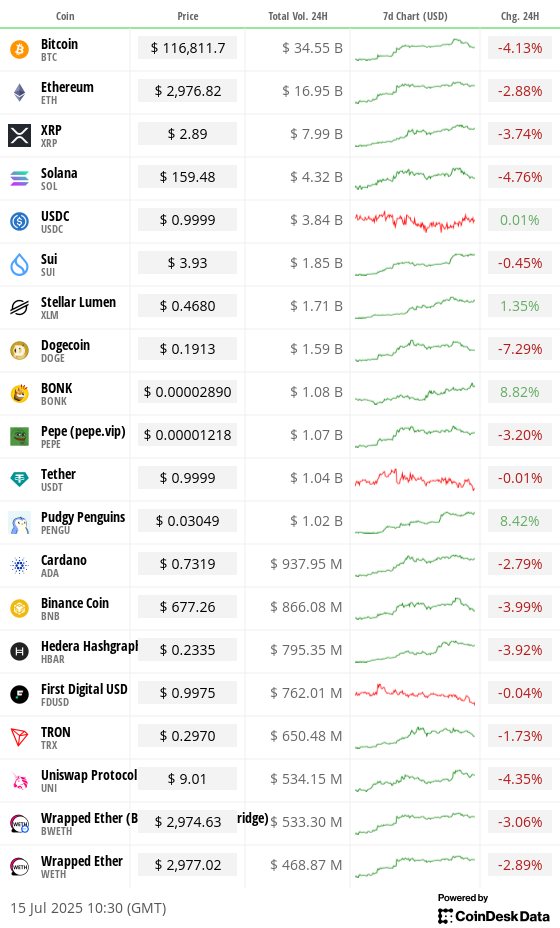
Chart of the Day
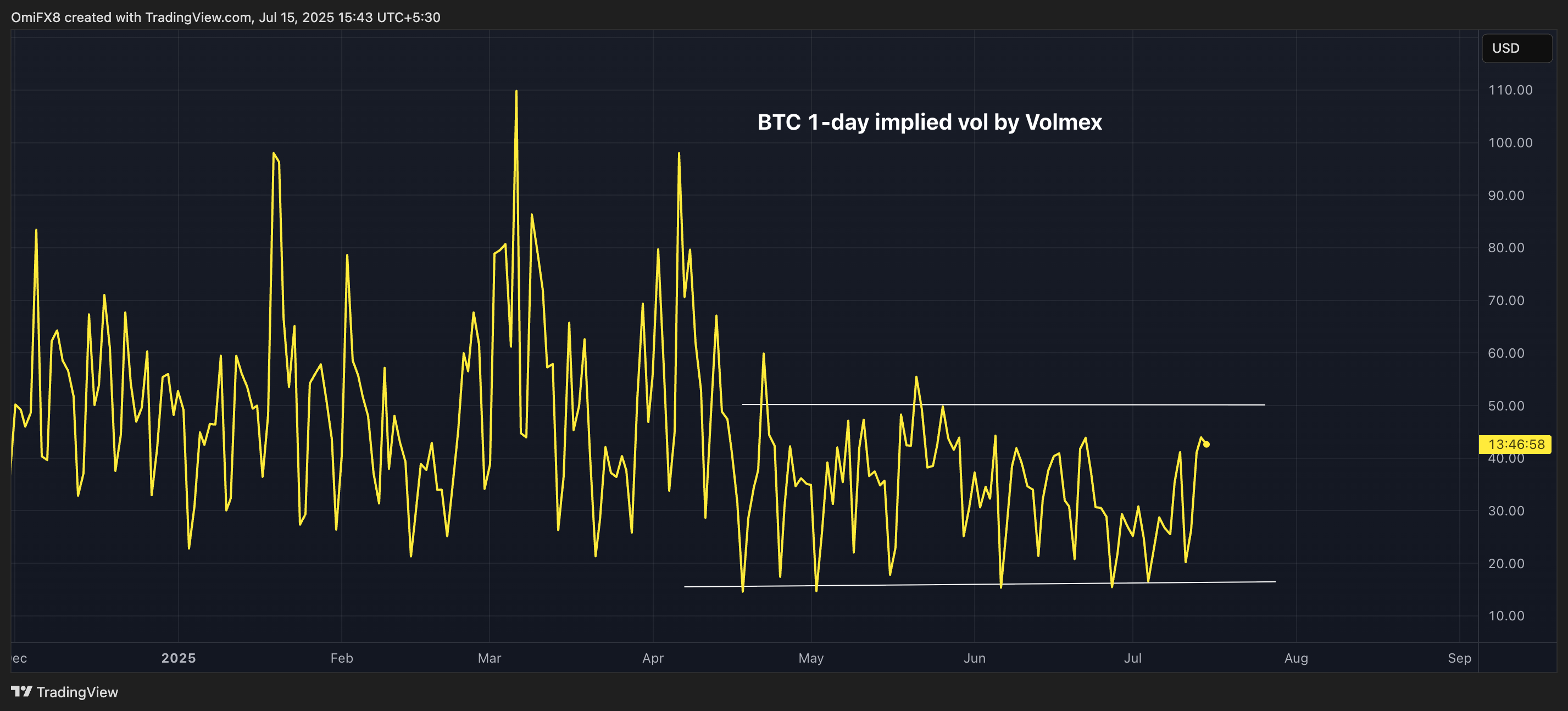
- Volmex’s annualized one-day BTC implied volatility index remains locked in a sideways range.
- It’s a sign that traders do not expect the impending U.S. CPI to breed significant market volatility.
While You Were Sleeping
- Bitcoin Rally Stalls as Long-Term Holders Cash Out (CoinDesk): Bitcoin dropped nearly 5% from its $123,000 peak with long-term holders — those holding BTC for over 155 days — accounting for the bulk of the $3.5 billion in profits realized over 24 hours.
- Standard Chartered Says It’s the First Global Bank to Offer Spot Bitcoin, Ether Trading (CoinDesk): Standard Chartered began offering spot bitcoin and ether trading to institutional clients in the U.K., saying it’s the first global systemically important bank to provide such crypto asset services.
- Strategy Bears Cave In as Anti-MSTR Leveraged ETF Hits Rock Bottom (CoinDesk): The Defiance Daily Target 2X Short MSTR ETF (SMST) dropped 7.6% to a record low of $18.17 on Monday, with trading volume reaching its second-highest level ever at 2.88 million shares.
- Behind Trump’s Tough Russia Talk, Doubts and Missing Details (The New York Times): Trump warned of 100% tariffs on Russia’s trade partners if no ceasefire with Ukraine emerges within 50 days. Analysts say the threat lacks teeth because targets include China and U.S. allies.
- China’s Economy Slows as Consumers Tighten Belts, US Tariff Risks Mount (Reuters): China’s second-quarter growth slipped to 5.2% year-over-year, and falling consumption and looming U.S. tariffs are fueling concern that more stimulus may be needed to meet the 5% annual growth target.
- Plan to Boost Returns From Russian Assets ‘Expropriation’, Warns Euroclear (Financial Times): The European securities depository holding most frozen Russian assets said EU plans to reinvest them more aggressively could deepen legal exposure, damage financial credibility and provoke further retaliation from Moscow.
- BofA Poll Shows Investors Flock Into Risk Assets at Record Pace (Bloomberg): The 175 fund managers surveyed by Bank of America boosted allocations to U.S. and eurozone stocks at a record pace, citing stronger earnings, tech momentum, and optimism about trade deal prospects.
In the Ether

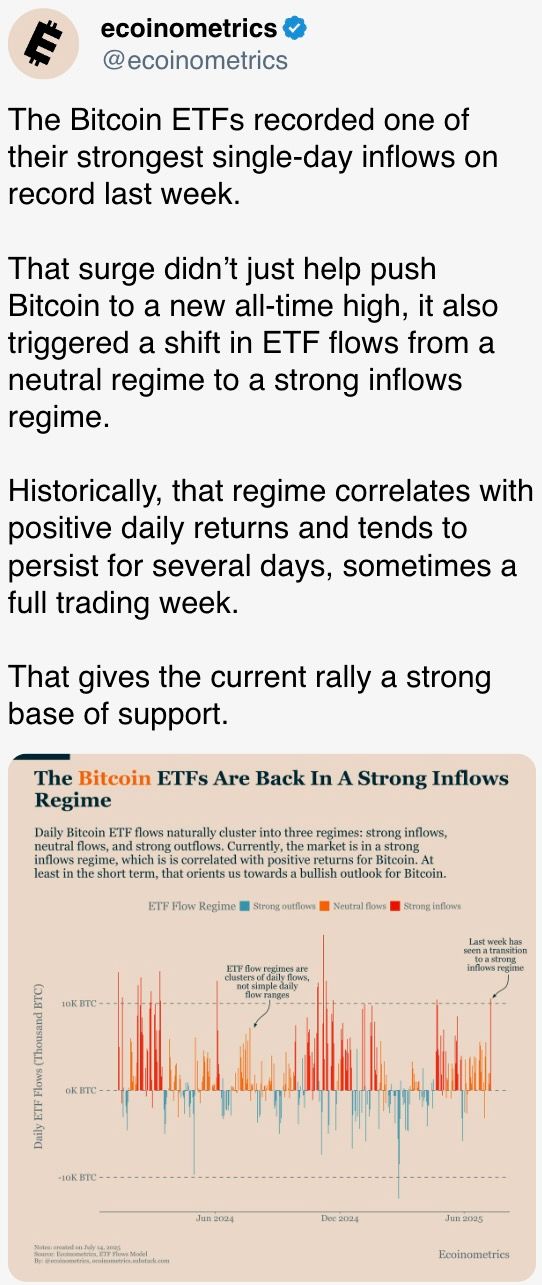

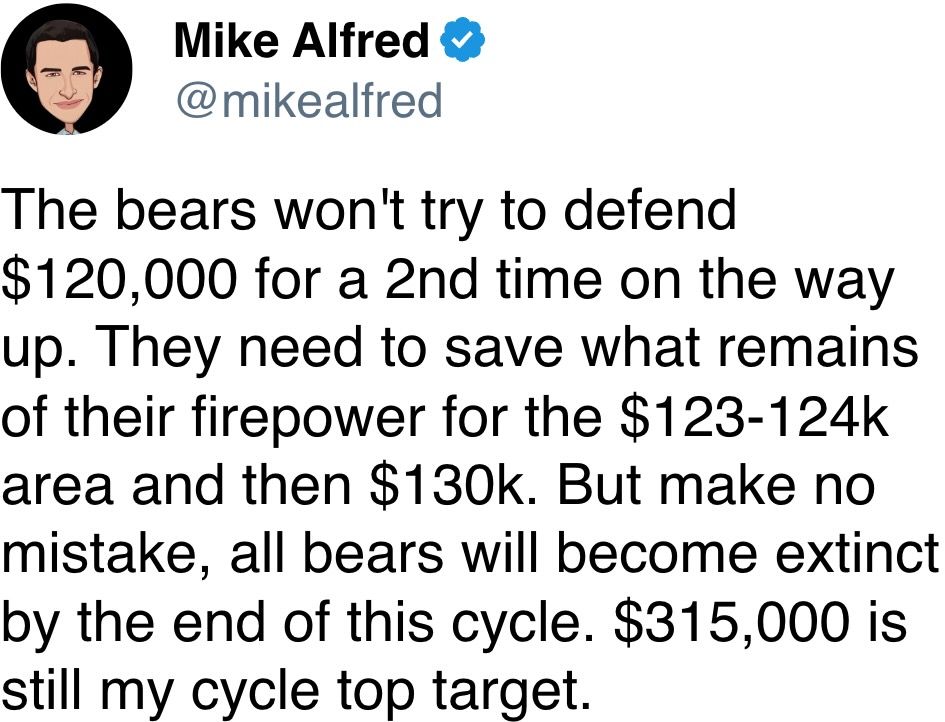
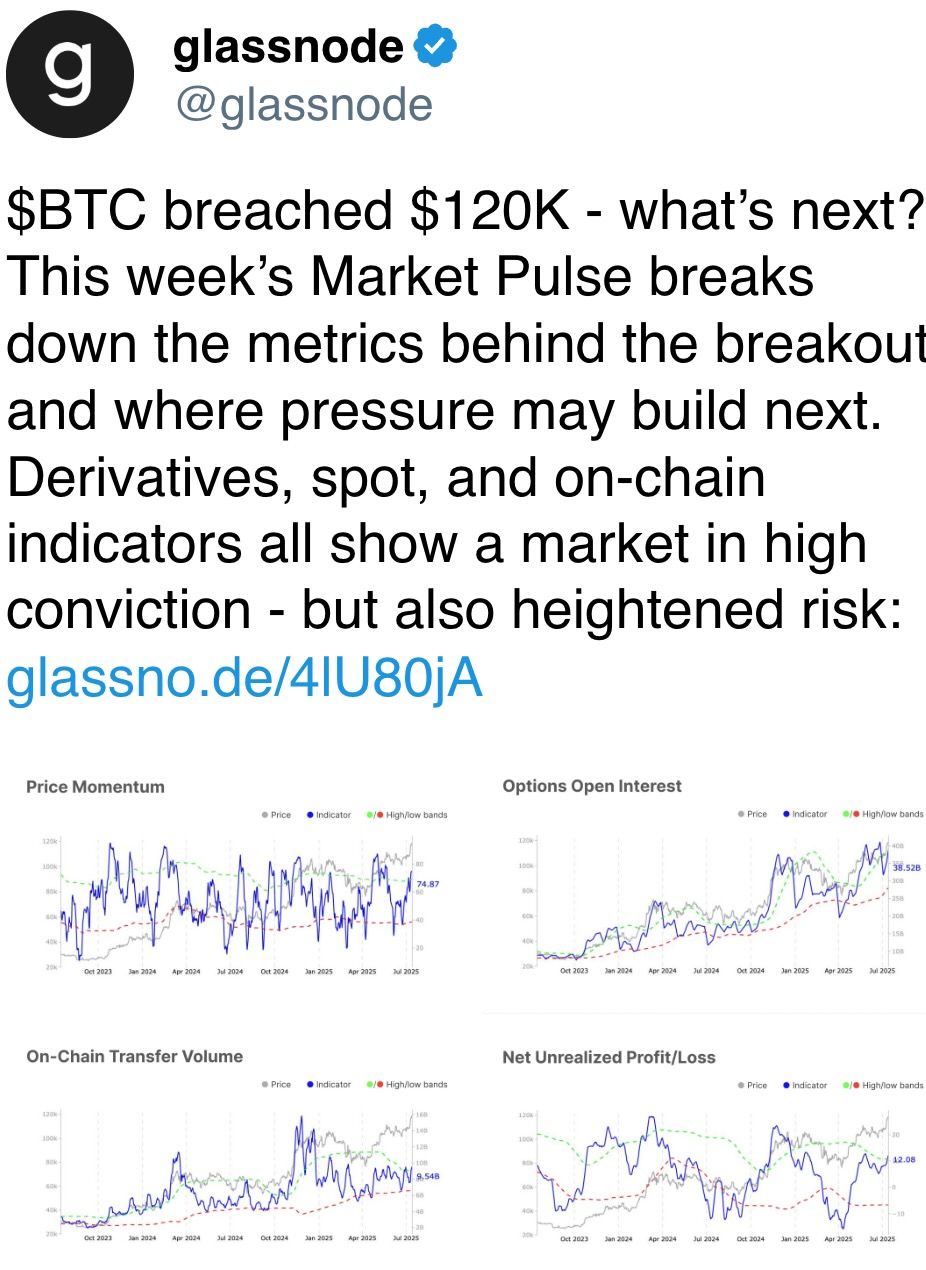
Uncategorized
Asia Morning Briefing: Fragility or Back on Track? BTC Holds the Line at $115K

Good Morning, Asia. Here’s what’s making news in the markets:
Welcome to Asia Morning Briefing, a daily summary of top stories during U.S. hours and an overview of market moves and analysis. For a detailed overview of U.S. markets, see CoinDesk’s Crypto Daybook Americas.
Bitcoin (BTC) traded just above $115k in Asia Tuesday morning, slipping slightly after a strong start to the week.
The modest pullback followed a run of inflows into U.S. spot ETFs and lingering optimism that the Federal Reserve will cut rates next week. The moves left traders divided: is this recovery built on fragile foundations, or is crypto firmly back on track after last week’s CPI-driven jitters?
That debate is playing out across research desks. Glassnode’s weekly pulse emphasizes fragility. While ETF inflows surged nearly 200% last week and futures open interest jumped, the underlying spot market looks weak.
Buying conviction remains shallow, Glassnode writes, funding rates have softened, and profit-taking is on the rise with more than 92% of supply in profit.
Options traders have also scaled back downside hedges, pushing volatility spreads lower, which Glassnode warns leaves the market exposed if risk returns. The core message: ETFs and futures are supporting the rally, but without stronger spot flows, BTC remains vulnerable.
QCP takes the other side.
The Singapore-based desk says crypto is “back on track” after CPI confirmed tariff-led inflation without major surprises. They highlight five consecutive days of sizeable BTC ETF inflows, ETH’s biggest inflow in two weeks, and strength in XRP and SOL even after ETF delays.
Traders, they argue, are interpreting regulatory postponements as inevitability rather than rejection. With the Altcoin Season Index at a 90-day high, QCP sees BTC consolidation above $115k as the launchpad for rotation into higher-beta assets.
The divide underscores how Bitcoin’s current range near $115k–$116k is a battleground. Glassnode calls it fragile optimism; QCP calls it momentum. Which side is right may depend on whether ETF inflows keep offsetting profit-taking in the weeks ahead.
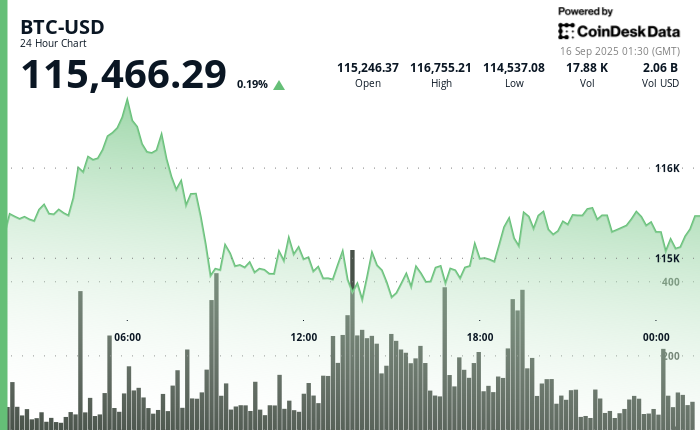
Market Movement
BTC: Bitcoin is consolidating near the $115,000 level as traders square positions ahead of expected U.S. Fed policy moves; institutional demand via spot Bitcoin ETFs is supporting upside
ETH: ETH is trading near $4500 in a key resistance band; gains are being helped by renewed institutional demand, tightening supply (exchange outflows), and positive technical setups.
Gold: Gold continues to hold near record highs, underpinned by expectations of Fed interest rate cuts, inflation risk, and investor demand for safe havens; gains tempered somewhat by profit‑taking and a firmer U.S. dollar
Nikkei 225: Japan’s Nikkei 225 topped 45,000 for the first time Monday, leading Asia-Pacific gains as upbeat U.S.-China trade talks and a TikTok divestment framework lifted sentiment.
S&P 500: The S&P 500 rose 0.5% to close above 6,600 for the first time on Monday as upbeat U.S.-China trade talks and anticipation of a Fed meeting lifted stocks.
Elsewhere in Crypto
Uncategorized
Wall Street Bank Citigroup Sees Ether Falling to $4,300 by Year-End

Wall Street giant Citigroup (C) has launched new ether (ETH) forecasts, calling for $4,300 by year-end, which would be a decline from the current $4,515.
That’s the base case though. The bank’s full assessment is wide enough to drive an army regiment through, with the bull case being $6,400 and the bear case $2,200.
The bank analysts said network activity remains the key driver of ether’s value, but much of the recent growth has been on layer-2s, where value “pass-through” to Ethereum’s base layer is unclear.
Citi assumes just 30% of layer-2 activity contributes to ether’s valuation, putting current prices above its activity-based model, likely due to strong inflows and excitement around tokenization and stablecoins.
A layer 1 network is the base layer, or the underlying infrastructure of a blockchain. Layer 2 refers to a set of off-chain systems or separate blockchains built on top of layer 1s.
Exchange-traded fund (ETF) flows, though smaller than bitcoin’s (BTC), have a bigger price impact per dollar, but Citi expects them to remain limited given ether’s smaller market cap and lower visibility with new investors.
Macro factors are seen adding only modest support. With equities already near the bank’s S&P 500 6,600 target, the analysts do not expect major upside from risk assets.
Read more: Ether Bigger Beneficiary of Digital Asset Treasuries Than Bitcoin or Solana: StanChart
Uncategorized
XLM Sees Heavy Volatility as Institutional Selling Weighs on Price

Stellar’s XLM token endured sharp swings over the past 24 hours, tumbling 3% as institutional selling pressure dominated order books. The asset declined from $0.39 to $0.38 between September 14 at 15:00 and September 15 at 14:00, with trading volumes peaking at 101.32 million—nearly triple its 24-hour average. The heaviest liquidation struck during the morning hours of September 15, when XLM collapsed from $0.395 to $0.376 within two hours, establishing $0.395 as firm resistance while tentative support formed near $0.375.
Despite the broader downtrend, intraday action highlighted moments of resilience. From 13:15 to 14:14 on September 15, XLM staged a brief recovery, jumping from $0.378 to a session high of $0.383 before closing the hour at $0.380. Trading volume surged above 10 million units during this window, with 3.45 million changing hands in a single minute as bulls attempted to push past resistance. While sellers capped momentum, the consolidation zone around $0.380–$0.381 now represents a potential support base.
Market dynamics suggest distribution patterns consistent with institutional profit-taking. The persistent supply overhead has reinforced resistance at $0.395, where repeated rally attempts have failed, while the emergence of support near $0.375 reflects opportunistic buying during liquidation waves. For traders, the $0.375–$0.395 band has become the key battleground that will define near-term direction.
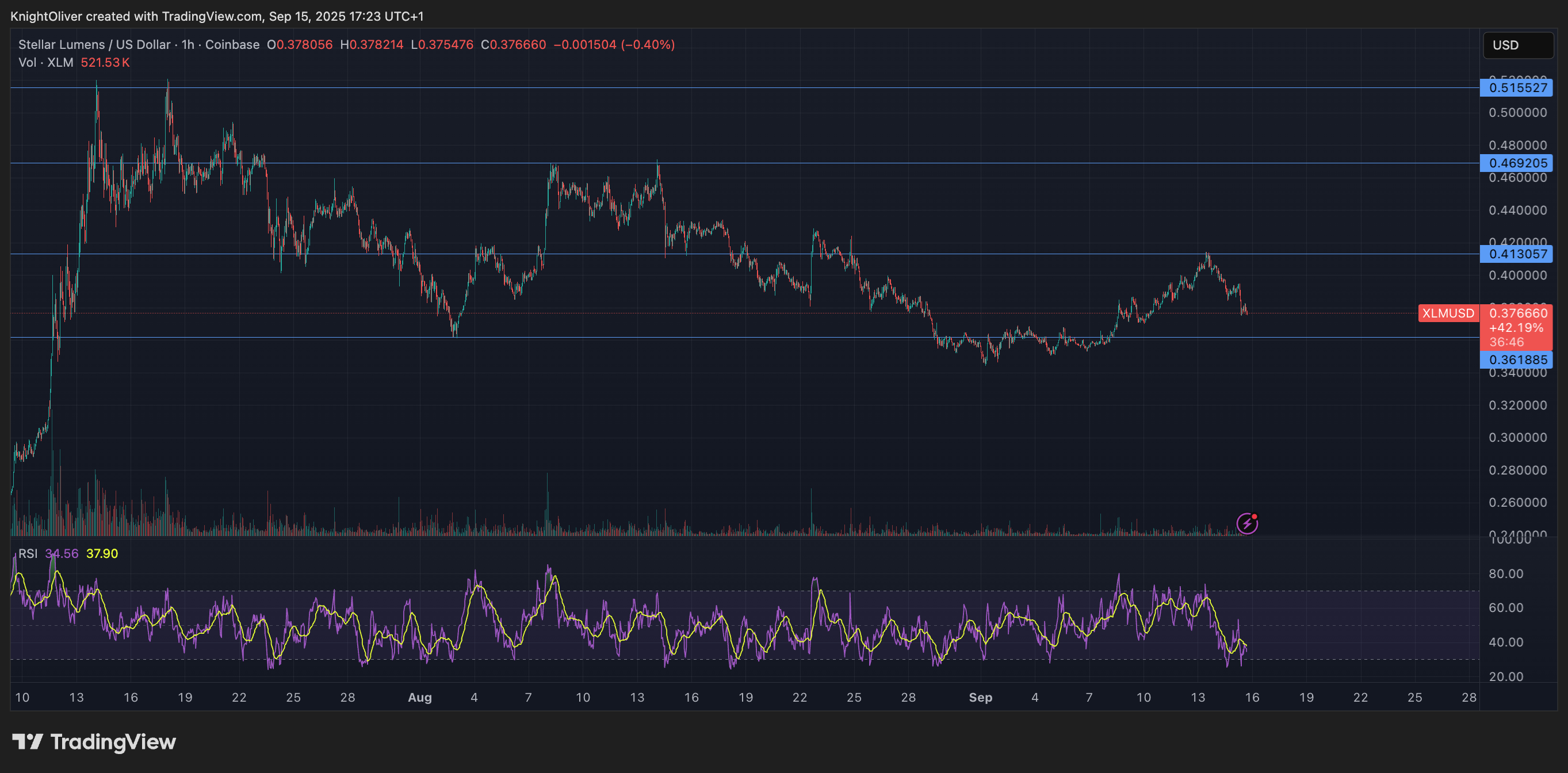
Technical Indicators
- XLM retreated 3% from $0.39 to $0.38 during the previous 24-hours from 14 September 15:00 to 15 September 14:00.
- Trading volume peaked at 101.32 million during the 08:00 hour, nearly triple the 24-hour average of 24.47 million.
- Strong resistance established around $0.395 level during morning selloff.
- Key support emerged near $0.375 where buying interest materialized.
- Price range of $0.019 representing 5% volatility between peak and trough.
- Recovery attempts reached $0.383 by 13:00 before encountering selling pressure.
- Consolidation pattern formed around $0.380-$0.381 zone suggesting new support level.
Disclaimer: Parts of this article were generated with the assistance from AI tools and reviewed by our editorial team to ensure accuracy and adherence to our standards. For more information, see CoinDesk’s full AI Policy.
-

 Business11 месяцев ago
Business11 месяцев ago3 Ways to make your business presentation more relatable
-

 Fashion11 месяцев ago
Fashion11 месяцев agoAccording to Dior Couture, this taboo fashion accessory is back
-

 Entertainment11 месяцев ago
Entertainment11 месяцев ago10 Artists who retired from music and made a comeback
-

 Entertainment11 месяцев ago
Entertainment11 месяцев ago\’Better Call Saul\’ has been renewed for a fourth season
-

 Entertainment11 месяцев ago
Entertainment11 месяцев agoNew Season 8 Walking Dead trailer flashes forward in time
-

 Business11 месяцев ago
Business11 месяцев ago15 Habits that could be hurting your business relationships
-

 Entertainment11 месяцев ago
Entertainment11 месяцев agoMeet Superman\’s grandfather in new trailer for Krypton
-

 Entertainment11 месяцев ago
Entertainment11 месяцев agoDisney\’s live-action Aladdin finally finds its stars





